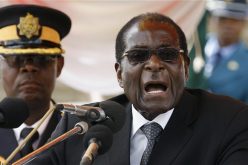 JOHANNESBURG — The Australian-based Walk Free Foundation has released its first-ever Global Slavery Index – a ranking of 162 countries by their prevalence of modern slavery. The Index found that tens of millions of people worldwide are living in slave-like conditions, most of them in Asia.
JOHANNESBURG — The Australian-based Walk Free Foundation has released its first-ever Global Slavery Index – a ranking of 162 countries by their prevalence of modern slavery. The Index found that tens of millions of people worldwide are living in slave-like conditions, most of them in Asia.
Slavery is often thought of as a relic of past centuries, and is banned internationally. But it is a shocking reality – today – for nearly 30 million people
Speaking to VOA from London, Index researcher Kevin Bales said Walk Free Foundation wants to raise awareness of the plight of modern slaves. He painted a chilling picture of the life of a slave in 2013.
“I suppose if you’re going to say, what’s the most common type of slave today, I would probably point to two [types]. One would be a type of hereditary slavery in South Asia, where families are born into slavery, they die in slavery, where one family belongs to another family and has for generations,” he explained. “All you know is slavery. You expect to be assaulted; you expect to be raped; you expect no other life except that of a slave.
“The other, I think most common type of slavery today would be the person who’s an economic hopeful migrant,” he continued. “Someone who’s looking for a way to better their lives, or the lives of their family and their children. And so they’re looking for a place of safety, they’re looking for a place of employment, and there are criminals who take advantage of that desire for safety and employment and lure people into situations outside their countries, their own country, where they can then be enslaved.”
Mauritania came in as the nation with the highest prevalence of modern slavery. The West African nation has a long history of hereditary slavery based on ethnicity. The index estimated that it holds as many as 160,000 slaves – among a population of just 3.8 million people. Mauritania’s government has repeatedly tried – and failed – to abolish the practice – most recently in 2007.
Bales acknowledged that some of the estimates in the index are conservative – in coming years, he says, the index will be able to further refine its figures.
India is estimated by the index to have the highest absolute number of modern slaves. The nation of 1.2 billion is thought to include a whopping 14 million people who live in slave-like conditions, which include forced labor, forced marriage, exploitation of children and debt bondage.
The foundation found that Asia is home to about 72 percent of the world’s slaves. China and Pakistan came in second and third behind India. China is thought to have about 2.9 million slaves. Pakistan, whose population is 1/7 that of China’s, has a stunning 2.1 million slaves.
Countries with high levels of slavery share poor development, corruption, poverty and conflict. Also, researchers noted, around the world, women are disproportionately affected by slavery, partly because of the prevalence of forced marriage and child marriage.
And, Bales said, the experience of girls and women slaves almost always has another, horrifying element.
“For almost every woman in slavery, there will be a sexual assault. It can be field, factory, working as a domestic servant or whatever. That’s why the enslavement of women is particularly harsh.”
Bales noted that despite the grim figures, slavery is teetering on the edge of oblivion. He said that the solutions differ country by country.
“There’s not a one-size-fits-all policy. But the good news is that that number is a tiny fraction of the 7 billion people who live on the planet. And they also contribute very little to the global economy,” Bales said. “So on one level, it’s paradoxical. It’s a very large number, but at the same time, it’s such a tiny number in relative terms, in a world where it’s illegal in every country, it’s not important to the economy and there’s an absolute moral consensus that we don’t want this.”
But even the best performers are not without problems. Iceland, Ireland and Britain tied for last place, but it is estimated that as many as 4,600 people live in conditions of modern slavery in the UK.










